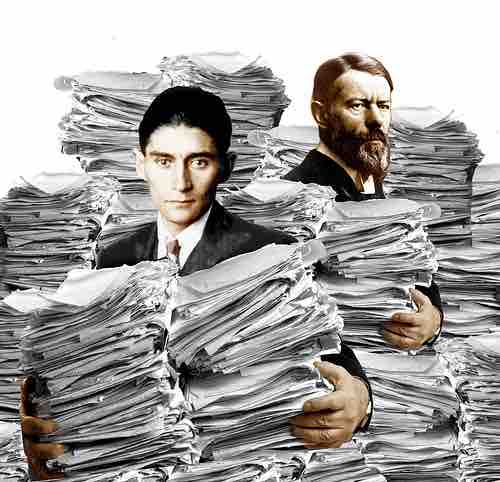Weberian bureaucracy was a term coined by Max Weber, a notable German sociologist, political economist, and administrative scholar, who contributed to the study of bureaucracy, administrative discourses, and literature during the mid-1800s and early 1900s . In his 1922 masterpiece, Economy and Society, Weber described many ideal types of public administration and governance. His critical study of the bureaucratization of society was one of the most enduring parts of this work. It was Weber who began the study of bureaucracy and whose works led to the popularization of this term. Many aspects of modern public administration date back to him. This is epitomized in the fact that a classic, hierarchically-organized civil service is still called a "Weberian civil service. "
Max Weber
Max Weber and Wilhelm Dilthey introduced verstehen—understanding behaviors—as goal of sociology.
Weber listed the following as preconditions for the emergence of bureaucracy: the growth in size and density of the population being administered, the growth in complexity of the administrative tasks being carried out, and the existence of a monetary economy requiring a more efficient administrative system. As a result of the development of communication and transportation technologies, like telegraphs and automobiles, a more efficient administration became not only possible but demanded by the public. Accompanying this shift was an increasing democratization and rationalization of culture. This resulted in public demands for a new administrative system that treated all humans equally. Weber's ideal bureaucracy is characterized by the following:
- hierarchical organization
- delineated lines of authority with fixed areas of activity
- action taken on the basis of, and recorded in, written rules
- bureaucratic officials with expert training
- rules implemented by neutral officials
- and career advancement depending on technical qualifications judged by organization, not individuals
Rational-Legal Authority
Weber identified in bureaucracies a rational-legal authority in which legitimacy is seen as coming from a legal order. The majority of modern bureaucratic officials and political leaders represent this type of authority. However, while recognizing bureaucracy as the most efficient form of organization, and perhaps indispensable for the modern state, Weber also saw it as a threat to individual freedoms. For Weber, the implementation of bureaucracies in government was a kind of rationalization, in which traditional motivators for behavior were cast aside. Instead of utilizing traditions, emotions, or values to motivate behavior, in a bureaucracy, people used rational calculation. Regarding Western societies, Weber called this increasing rationalization an "iron cage" that trapped individuals in systems based solely on efficiency, rational calculation, and control. In his theory, the "iron cage" is the one set of rules and laws that we are all subjected to. According to Weber, the shift from old forms of mobility, like kinship, to new forms, like strict, legal rules, was a direct result of the growth of bureaucracy and capitalism.

Kafka and Weber
This is an illustration of the fiction writer, Franz Kafka, who wrote about bureaucratic nightmares, and the sociologist, Max Weber, who studied bureaucracies.